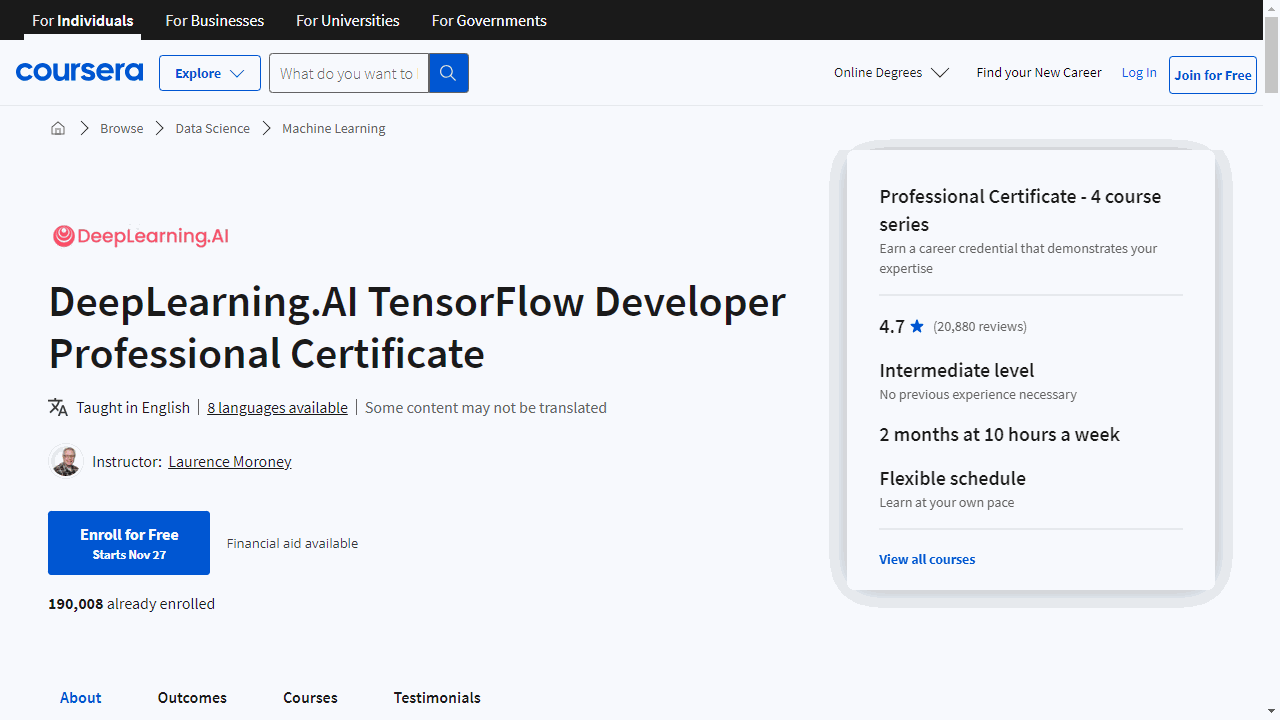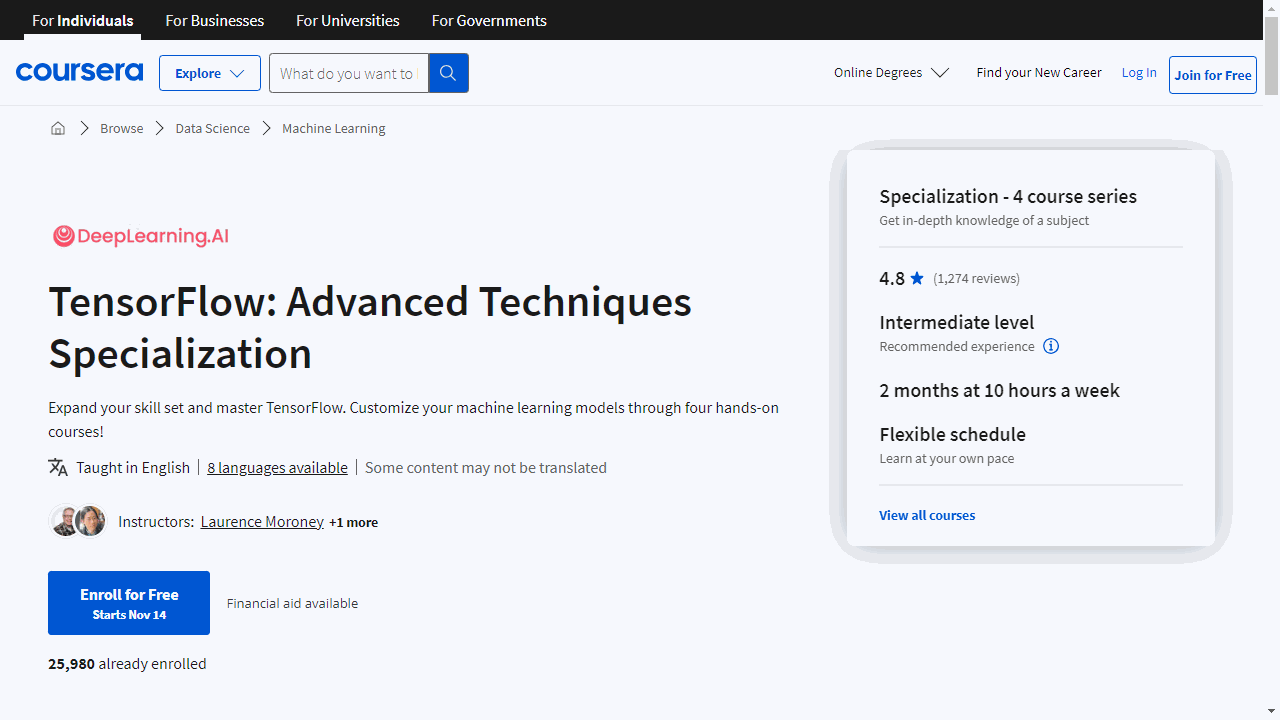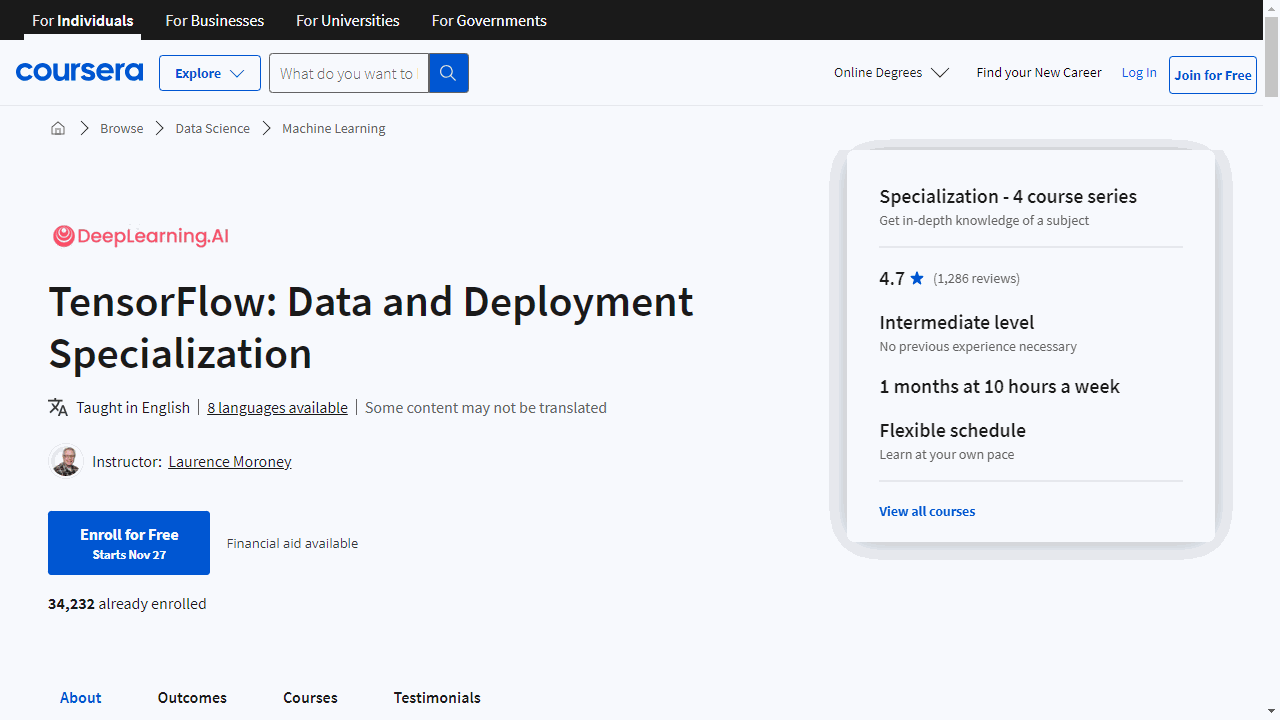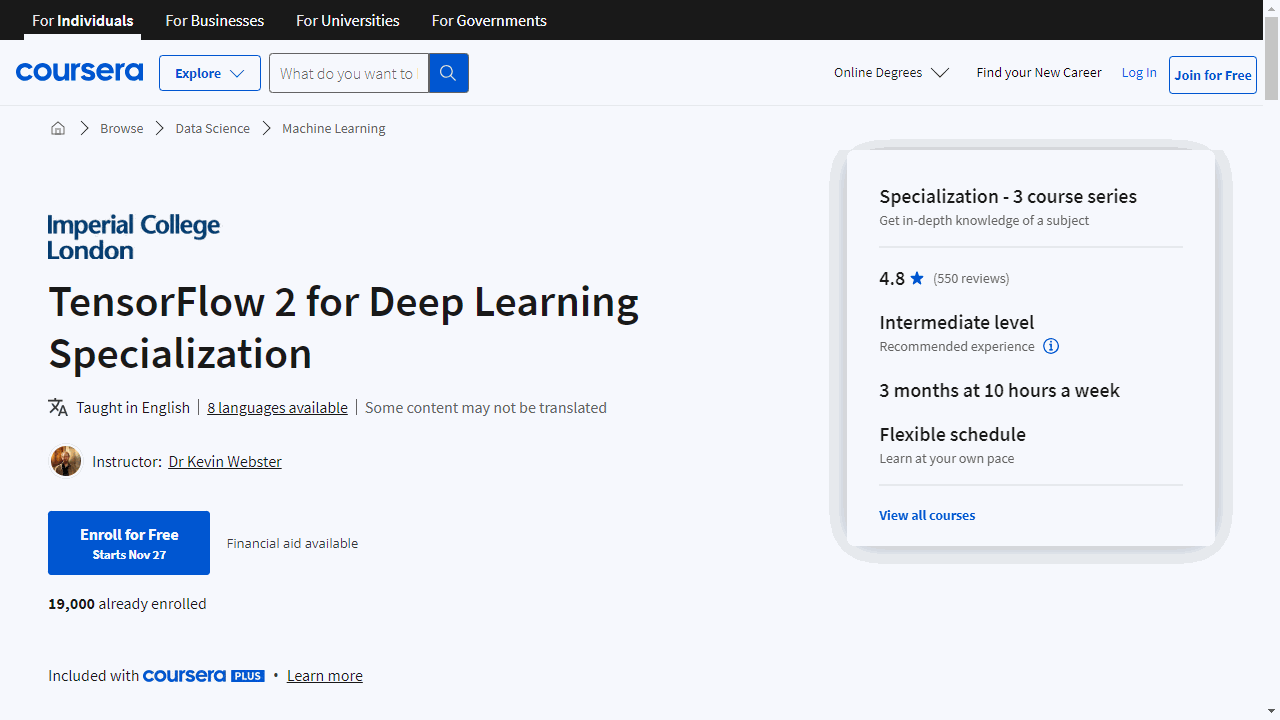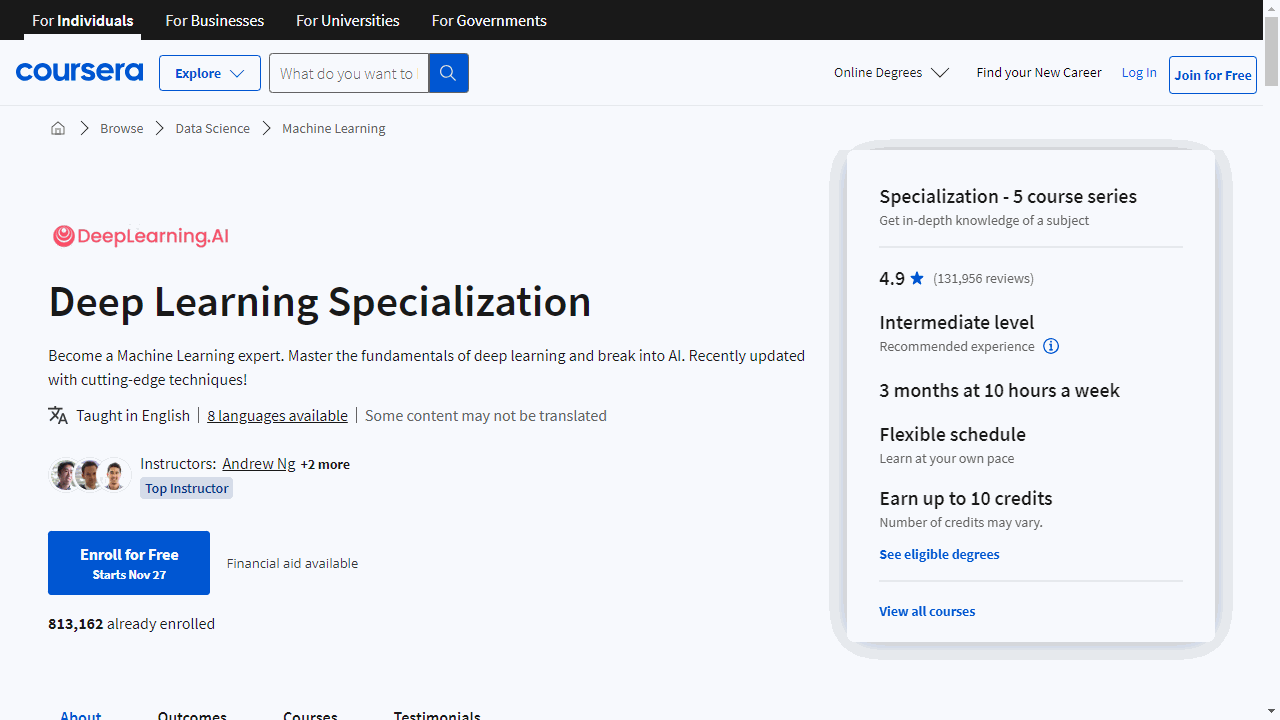TensorFlow is a powerful open-source library developed by Google for machine learning and deep learning.
It’s used for a wide range of tasks, including image classification, natural language processing, and time series forecasting.
By mastering TensorFlow, you can build, train, and deploy powerful AI models, opening doors to exciting career opportunities in fields like data science, machine learning engineering, and research.
Finding the right TensorFlow course on Coursera can be overwhelming, with so many options available.
You’re looking for a program that’s comprehensive, engaging, and taught by experts, but also fits your learning style and goals.
We understand the need for a reliable guide in this vast landscape.
For the best TensorFlow course overall on Coursera, we recommend the DeepLearning.AI TensorFlow Developer Professional Certificate.
This program is a comprehensive four-course journey that covers everything from TensorFlow fundamentals to advanced techniques like building custom models, distributed training, and deploying your models in production.
The curriculum is designed by industry experts, providing real-world examples and practical exercises that ensure you gain the skills needed to confidently apply TensorFlow to your projects.
This is just one of many great TensorFlow courses available on Coursera.
Keep reading to discover other options tailored to different learning levels, specific areas of TensorFlow, and career aspirations.
DeepLearning.AI TensorFlow Developer Professional Certificate
This series of courses is designed to equip you with the TensorFlow (developed by Google) expertise needed to build AI algorithms that scale.
The journey begins with “Introduction to TensorFlow for Artificial Intelligence, Machine Learning, and Deep Learning,” where you’ll grasp the essentials of TensorFlow and construct a neural network for image recognition tasks.
It’s a practical first step that lays a solid foundation for more advanced concepts.
As you progress to “Convolutional Neural Networks in TensorFlow,” you’ll delve into sophisticated image processing techniques.
This course sharpens your skills in handling diverse image data and introduces you to strategies like augmentation and dropout to combat overfitting.
Transfer learning is also covered, teaching you to leverage pre-trained models for enhanced performance.
Shifting focus to language, “Natural Language Processing in TensorFlow” offers a deep dive into text handling and sentiment analysis.
You’ll explore tokenization, vectorization, and the use of recurrent neural networks (RNNs), including GRUs and LSTMs, to process and generate text.
Finally, “Sequences, Time Series and Prediction” rounds out your education with an exploration of time series data.
You’ll learn to prepare and forecast data, employing RNNs and ConvNets for tasks like sunspot prediction, which combines scientific inquiry with machine learning.
Each course is rich with practical applications, ensuring you not only learn the theory but also how to apply it.
The certificate is self-paced, allowing you to learn on your schedule, and it’s backed by DeepLearning.AI’s reputation for quality AI education.
TensorFlow: Advanced Techniques Specialization
This specialization is tailored for those with a foundational understanding of Python and TensorFlow, aiming to enhance their skills in building sophisticated machine learning models.
The course “Custom Models, Layers, and Loss Functions with TensorFlow” offers a deep dive into the intricacies of TensorFlow’s and Keras APIs.
You’ll learn to construct multi-output models, including Siamese networks, and delve into the creation of custom loss functions to fine-tune your model’s learning process.
The course also covers the development of custom layers and the implementation of your own model classes, empowering you to design a ResNet from the ground up.
In “Custom and Distributed Training with TensorFlow,” the focus shifts to gaining granular control over model training.
You’ll explore TensorFlow’s core components and learn to manage training loops manually for greater flexibility.
The course also introduces distributed training, a technique that accelerates the training process by leveraging multiple GPUs or TPUs, enabling you to handle larger datasets and more complex models efficiently.
“Advanced Computer Vision with TensorFlow” is the core of this specialization for computer vision enthusiasts.
It covers a broad range of topics, from image classification and segmentation to object localization and detection.
You’ll apply transfer learning to practical tasks and customize cutting-edge models.
The course also emphasizes model interpretability, teaching you to use class activation and saliency maps to understand and improve your model’s decision-making process.
Lastly, “Generative Deep Learning with TensorFlow” explores the creative side of machine learning.
You’ll experiment with neural style transfer, combining the aesthetics of famous artworks with your images.
The course guides you through building AutoEncoders for image denoising and introduces you to the fascinating world of VAEs and GANs, where you’ll learn to generate new, unique data, such as anime faces.
The teacher, Laurence Moroney, is a Google AI advocate and the author of several books.
TensorFlow: Data and Deployment Specialization
This suite of courses is tailored to equip you with the necessary skills to bring machine learning models to life in various environments.
It’s recommended to have a background in TensorFlow before starting this specialization.
If you’re new, the “DeepLearning.AI TensorFlow Developer Professional Certificate” is a suggested prerequisite, and for a deeper dive into neural networks, the “Deep Learning Specialization” is beneficial.
The specialization kicks off with “Browser-based Models with TensorFlow.js,” where you’ll learn to train and deploy machine learning models directly in the browser.
This course empowers you to handle data seamlessly and build interactive applications, like a webcam-based object recognition system, using TensorFlow.js.
Moving on to “Device-based Models with TensorFlow Lite,” the focus shifts to mobile and embedded devices.
You’ll gain the expertise to optimize models for low-power devices and execute them on Android, iOS, and even Raspberry Pi.
This course is essential for those looking to deploy efficient, on-the-go machine learning solutions.
In “Data Pipelines with TensorFlow Data Services,” you’ll tackle ETL tasks with TensorFlow Data Services APIs, enhancing your ability to manage and prepare data for training.
You’ll also learn to identify and optimize bottlenecks in your data pipelines, ensuring your models are trained with efficiency and speed.
The final course, “Advanced Deployment Scenarios with TensorFlow,” introduces you to TensorFlow Serving for web-based inference, TensorFlow Hub for transfer learning, and TensorBoard for model evaluation and metadata sharing.
Additionally, it covers federated learning, a technique for updating models with user data while preserving privacy.
TensorFlow 2 for Deep Learning Specialization
This comprehensive program is structured to elevate your skills progressively, ensuring a deep and practical understanding of Google TensorFlow’s capabilities.
Prerequisites include proficiency in Python, familiarity with machine learning concepts, and a working knowledge of deep learning architectures.
The journey begins with “Getting started with TensorFlow 2,” where you’ll establish a solid foundation.
You’ll learn to build, train, and evaluate models using the Sequential API, and delve into model validation and regularization.
The course emphasizes practical application, with coding tutorials and a Capstone Project where you’ll develop an image classifier, integrating the core concepts you’ve learned.
As you progress to “Customising your models with TensorFlow 2,” the focus shifts to customization.
You’ll explore TensorFlow’s lower-level APIs, crafting complex model architectures and bespoke layers.
The course also introduces sequence models, expanding your toolkit for applications like natural language processing.
The hands-on approach continues, culminating in a Capstone Project where you’ll create a neural translation model.
The final course, “Probabilistic Deep Learning with TensorFlow 2,” tackles the challenge of uncertainty in data—a critical skill for real-world applications.
Leveraging the TensorFlow Probability library, you’ll build probabilistic models, including Bayesian neural networks and variational autoencoders.
The course’s practical elements are designed to solidify your understanding, and the final Capstone Project involves developing a generative model for a synthetic image dataset.
Each course is rich with hands-on tutorials, guided by experienced teaching assistants, and the Capstone Projects ensure that your learning is applied and consolidated.
Deep Learning Specialization
This comprehensive program is designed to equip you with the skills needed to excel in AI and machine learning.
Starting with “Neural Networks and Deep Learning,” you’ll delve into the core concepts that power AI breakthroughs.
This course lays the foundation, teaching you to construct and train deep neural networks using TensorFlow, setting the stage for advanced learning.
Progressing to “Improving Deep Neural Networks: Hyperparameter Tuning, Regularization and Optimization,” you’ll unlock the secrets behind enhancing neural network performance.
This course is a deep dive into the intricacies of TensorFlow, focusing on practical techniques like hyperparameter tuning and optimization algorithms that are crucial for fine-tuning your models.
In “Structuring Machine Learning Projects,” you’ll shift gears to strategic thinking, learning to lead machine learning projects with confidence.
This course offers insights into project management in the AI space, teaching you to navigate complex machine learning settings and make decisions that can propel your projects to success.
“Convolutional Neural Networks” introduces you to the transformative world of computer vision.
You’ll explore how to apply these networks to tasks such as image recognition and style transfer, gaining hands-on experience with TensorFlow to process visual data.
Finally, “Sequence Models” rounds out the specialization by immersing you in the applications of sequence data.
From speech recognition to NLP, you’ll learn to build models that handle sequential information, using TensorFlow to tackle challenges like machine translation and chatbot creation.
